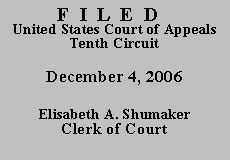

| UNITED STATES OF AMERICA, |
(D.C. Nos. 04-CV-3123-JAR and
02-CR-40140-JAR |
Before MURPHY, SEYMOUR, and McCONNELL, Circuit Judges.
Weidner is the former president, chief executive officer, and general counsel of Capital City Bank in Topeka, Kansas. He was charged in a seven-count superseding indictment with conspiracy, making false bank entries, and money laundering. The charges stemmed from a $1.5 million line of credit Weidner extended to a bank customer. On the morning his trial began, Weidner pleaded guilty to Counts 3 and 4 of the indictment. These two counts charged Weidner with making false bank entries, reports, and transactions in violation of 18 U.S.C. § 1005.(1)
Weidner filed the instant § 2255 motion on April 19, 2004, alleging his counsel's ineffective assistance rendered his guilty plea unknowing and involuntary. Specifically, Weidner alleged his attorneys "induced" him to plead guilty to Counts 3 and 4 by misrepresenting he had no credible defense, and refusing to call certain witnesses to testify on his behalf because of a conflict of interest. The district court denied Weidner's motion, concluding Weidner failed to demonstrate his counsel's performance was constitutionally deficient. See Strickland v. Washington, 466 U.S. 668, 688 (1984). The district court thoroughly evaluated Weidner's claims by reviewing the entire record, including the transcript of the plea colloquy and an affidavit submitted by one of Weidner's attorneys.
To be entitled to a COA, Weidner must make "a substantial showing of the denial of a constitutional right." 28 U.S.C. § 2253(c)(2). To make the requisite showing, he must demonstrate "that reasonable jurists could debate whether (or, for that matter, agree that) the petition should have been resolved in a different manner or that the issues presented were adequate to deserve encouragement to proceed further." Miller-El v. Cockrell, 322 U.S. 322, 336 (2003) (quotations omitted). In evaluating whether Weidner has satisfied his burden, this court undertakes "a preliminary, though not definitive, consideration of the [legal] framework" applicable to each of his claims. Id. at 338. Although Weidner need not demonstrate his appeal will succeed to be entitled to a COA, he must "prove something more than the absence of frivolity or the existence of mere good faith." Id.
In his application for a COA and appellate brief, Weidner asserts the district court erred when it denied his ineffective assistance claims without holding an evidentiary hearing. The district court need not conduct an evidentiary hearing, however, if "the [§ 2255] motion and the files and records of the case conclusively show that the prisoner is entitled to no relief." 28 U.S.C. § 2255. Having undertaken a review of Weidner's application for a COA and appellate filings, the district court's order, and the entire record on appeal pursuant to the framework set out by the Supreme Court in Miller-El, this court concludes the district court's resolution of Weidner's § 2255 motion is not reasonably subject to debate and the issues he seeks to raise on appeal are not adequate to deserve further proceedings. Accordingly, this court denies Weidner's request for a COA and dismisses this appeal.
Entered for the Court
ELISABETH A. SHUMAKER, Clerk
By
Deputy Clerk
1.Wiedner was convicted after a jury trial on the five other counts charged in the superseding indictment and sentenced to concurrent terms of seventy-eight months' incarceration on all seven counts. On appeal, the convictions were affirmed but his sentence was vacated. United States v. Weidner, 437 F.3d 1023, 1050 (10th Cir. 2006). Weidner was resentenced on April 24, 2006 to sixty months' imprisonment on each count, to be served concurrently.